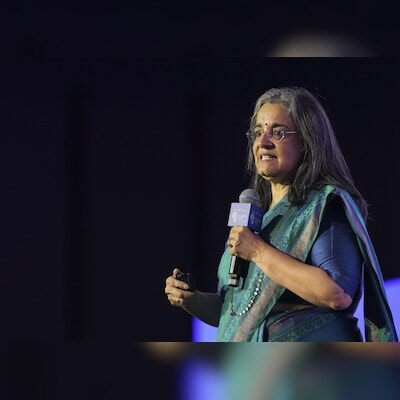)
File photo of Sebi chief Madhabi Puri Buch | Source: : PTI
ICICI Bank on Monday said it has not paid any salary or granted ESOPs to Sebi chairperson Madhabi Puri Buch after her retirement on October 31, 2013, as alleged by the Congress.
Earlier in the day, the Congress alleged that Buch, who joined Sebi as a member in 2017 and subsequently became its chairperson, received Rs 16.8 crore from ICICI Bank as salary and other compensation.
“ICICI Bank or its group companies have not paid any salary or granted any ESOPs to Madhabi Puri Buch after her retirement, other than her retiral benefits. It may be noted that she had opted for superannuation with effect from October 31, 2013,” the bank said in a statement.
During her employment with the ICICI Group, she received compensation in the form of salary, retiral benefits, bonus and ESOPs, in line with applicable policies, it added.
“Under the bank’s ESOP rules, the ESOPs vest over the next few years from the date of allotment. As per rules existing at the time of her ESOP grant, employees, including retired employees, had the choice to exercise their ESOPs anytime up to a period of 10 years from the date of vesting,” it said.
The Congress has alleged that the Sebi chairperson has received Rs 16.8 crore from ICICI group since 2017, which is 5.09 times the income she got from the markets regulator.
Congress General Secretary in-charge communications Jairam Ramesh said serious questions have been raised over the conflict of interest of the Sebi chairperson in the regulatory body’s Supreme Court-mandated investigations into violations of securities laws by the Adani Group.
“These questions seem to have been simply brushed aside by the Government of India. Now comes this fresh revelation of shocking illegality,” Ramesh said in a post on X.
ICICI Bank further said that all the payments made to Buch post her retirement had accrued to her during the employment phase with the ICICI Group.
These payments comprise ESOPs and retiral benefits, it added.
As per Income Tax rules, the statement said the difference between the price of the stock on the day of exercise and the allotment price is treated as perquisite income and is reflected in Part B of Form 16 of employees, including retired employees.
The bank is required to deduct the perquisite tax on this income. In addition, Form -16 covers the payment made towards the retiral benefits of former employees, it noted.
The Congress’ fresh allegations come days after Hindenburg Research launched a fresh broadside against market regulator Sebi chairperson Buch, alleging that she and her husband had stakes in obscure offshore funds used in the Adani money siphoning scandal.
Buch had denied the allegations levelled against them as baseless and asserted that their finances are an open book.
Adani Group had also termed Hindenburg allegations, as malicious and manipulative of select public information, saying it has no commercial relationship with the Sebi chairperson or her husband.
Here is the clarification from ICICI Bank:
It has come to our attention that there are certain reports in media alleging payment of salary by ICICI Group to Madhabi Puri Buch, Chairperson, Sebi. In this connection, we would like to clarify as follows:
“ICICI Bank or its group companies have not paid any salary or granted any ESOPs to Ms. Madhabi Puri Buch after her retirement, other than her retiral benefits. It may be noted that she had opted for superannuation with effect from October 31, 2013. During her employment with the ICICI Group, she received compensation in the form of salary, retiral benefits, bonus and ESOPs, in line with applicable policies.
Under the Bank’s ESOP rules, the ESOPs vest over the next few years from the date of allotment. As per rules existing at the time of her ESOP grant, employees including retired employees had the choice to exercise their ESOPs anytime up to a period of 10 years from the date of vesting.
As per Income Tax rules, the difference between the price of the stock on the day of exercise and the allotment price is treated as perquisite income and is reflected in Part B of the Form-16 of employees, including retired employees. The Bank is required to deduct the perquisite tax on this income. In addition, Form -16 covers the payment made towards the retiral benefits of
former employees. All the payments made to Ms. Buch post her retirement had accrued to her during her
employment phase with the ICICI Group. These payments comprise ESOPs and retiral benefits.”
First Published: Sep 02 2024 | 7:17 PM IST
